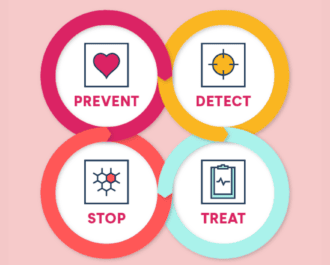
Over the past few decades, better treatment and earlier detection has led to a dramatic improvement in breast cancer survival in Australia. Despite this, breast cancer remains the largest cancer-related cause of disease burden in our community.
For NBCF-funded researcher Professor Kelly-Anne Phillips from Melbourne’s Peter MacCallum Cancer Centre, this burden cannot be over-emphasised.
“Breast cancer places a huge burden on families, workplaces and the community generally,” she says. “It strikes a chord for all of us, because it is a relatively common disease with a big ripple effect into the community.”
It’s this far-reaching impact of breast cancer that is driving Professor Phillips to change the way we manage breast cancer risk in Australia.
Through an NBCF Practitioner Fellowship, Professor Phillips is developing and testing a breast cancer risk assessment and risk management tool, called iPrevent, to help doctors easily assess and effectively manage breast cancer risk in their patients.
“We know that on average for Australian women, the lifetime risk of developing breast cancer is about 12%,” explains Professor Phillips. “But that average statistic is actually not very helpful for individuals … most women are at a much lower risk, while some women have a much greater risk – up to 80% if they carry a breast cancer gene mutation.”
“It’s really important to identify each individual woman’s risk factors, so that we can assess her personal breast cancer risk and then manage that risk with screening and prevention strategies that are appropriate to her personal risk level.”
Empowering doctors with an easy-to-use tool to conduct individualised risk assessments means that women who are found to be at high risk of breast cancer can be offered prevention strategies, such as risk reducing surgery, risk reducing medication or more intensive screening.

Individual risk assessment is a tried and tested method of improving health outcomes. As Professor Phillips points out, routine assessment of blood pressure and cholesterol by GPs has improved the management of cardiovascular disease risk and reduced deaths throughout Australia. Professor Phillips wants to see the same approach for breast cancer.
“If tomorrow, every woman in Australia had her breast cancer risk assessed and managed appropriately, we would dramatically reduce the incidence rate of breast cancer over the coming decades.”
Professor Phillips hopes this research and the resulting risk assessment and risk management tool will help to transform clinical practice in Australia, reducing the burden of breast cancer on Australian women and their families.
“If we ask the average woman on the street what her risk of breast cancer is, most women won’t really know … and they won’t have had their personal breast cancer risk assessed,” says Professor Phillips. “I would like to see breast cancer risk being routinely assessed in primary care so that all women are aware of whether they are at average, moderate or high risk of breast cancer, and what the appropriate interventions are for them.”
Professor Phillips’ research has real potential to reduce the burden of breast cancer in Australia by tackling risk and implementing evidence-based prevention strategies before the disease occurs.
This research, and the work of many other talented Australian researchers, would not be possible without funding from organisations like NBCF.
“There is an awful lot of amazing breast cancer research going on in this country,” says Professor Phillips. “When you have a lot of really good researchers doing a lot of really good research, you need to fund it. So we always need money for breast cancer research.”
For Professor Phillips, the practical and supportive nature of NBCF funding and grant schemes sets NBCF apart as a true partner for Australia’s best breast cancer researchers.
“NBCF provides funding that has been very well thought out,” she says. “The Fellowship that I have from NBCF funds part of my salary. It means I can have protected time for research and this is absolutely essential. Research takes a long time.”
Professor Phillips also has high praise for other NBCF grant schemes, such as the Innovator grants and the Think Tanks, saying that they are unique funding approaches that truly help to kick start Australian research.
“NBCF has identified that there are a lot of good ideas out there and you have to take the risk to fund those really good ideas to see them come to fruition.”
More News Articles
View all News


